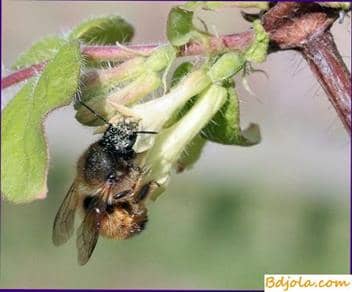
Honey for children
The products of bees are harmless and, in comparison with synthetic preparations, are slower and softer. Thanks to the natural synchronous interaction with our body, they have a stable positive impact on it.
A useful and pleasant product is honey. Since ancient times it has been used as a medicine. Aristotle, called “the sun of ancient beekeeping,” believed that honey has special qualities that are extremely favorable to the human body. Hippocrates prescribes honey to both sick and healthy people.
Honey is extremely useful for children. The first reports on the use of honey in baby food reached us date back to the 9th century BC. e. In ancient Egypt, honey was given to students in schools. The first pediatrist of Ancient Rome, Soran of Ephesus, who lived in the 11th century BC. E., recommended honey to newborn children, believing that it increases appetite and is good for the stomach. Modern medicine also recommends honey to children. Under his influence, their body makes better use of calcium and magnesium from milk, which contributes to the normal development of bone and dental tissues. Honey is the source of digestible iron, thereby preventing and curing anemia. The content of organic acids promotes the development of appetite and normal metabolism. American nutritionists have shown that honey is indispensable in feeding infants, as well as growing children. Add to the milk,
Spanish researchers found a positive effect of honey added to artificial female milk, and recommended giving it to infants.
It is especially necessary for prematurely born babies, as well as for infants with hypochromic anemia and for newborn jaundice. Children gain weight well, their hemoglobin content increases; there is a good digestibility of food and a beneficial effect on the intestinal microflora. For therapeutic purposes, honey is prescribed for infants with dyspepsia, as well as for intestinal and other infections, constipation, anorexia. According to data in 1975, seventeen enterprises in different cities of Spain produce 122 names of products with honey, including flour, cereals, biscuits, cocoa, fruit, yogurt, etc., intended for feeding children of different ages.
Children suffering from anemia, pulmonary diseases and disorders of the nervous system, Swiss doctors successfully treated with milk and honey.
In Japan, Professor Vabima and his colleagues demonstrated clinically that anemia, diarrhea, delayed growth and development, often observed in infants who are artificially fed, can be eliminated by adding honey to cow or goat milk. In addition, the researchers found that dysentery, often observed in artificially-fed infants, can be quickly cured by adding honey to the food.
In the 1940s, in the first model children’s hospital in Moscow, under the direction of Professor Rozanov, a treatment was carried out with honey from oral diseases. Honey was prescribed externally and inward (for 20-75 g) to seriously ill children aged from one year to two and a half years.
NP Ioyrish (1974), watching 230 children aged 7 to 15 years, was convinced of the beneficial effect of honey on their health. The author recommends giving them up to 30-40 grams of honey per day.
It is useful to use a 10-20% aqueous solution of honey for mouthwash with diseases of the oral cavity. This removes the destructive effect of sugar on the teeth and prevents intestinal infections.
The oldest apotherapeutist BA Okhotskiy emphasizes that children at any age accept honey quickly and develop better. He recommends systematically adding honey to cottage cheese, cereals, drinks, milk.
S. Mladenov (1974) quotes Dr. Zeiss of Heidelberg, who writes: “I give bee honey to my children from the first day of birth, my children have never been sick.”
So that our children are always healthy, cheerful, well-trained and growing, we should give them a spoonful of honey daily, preferably before meals.
Пасека на чердаке. Обработка пчел щавельной кислотой.
Bee Products